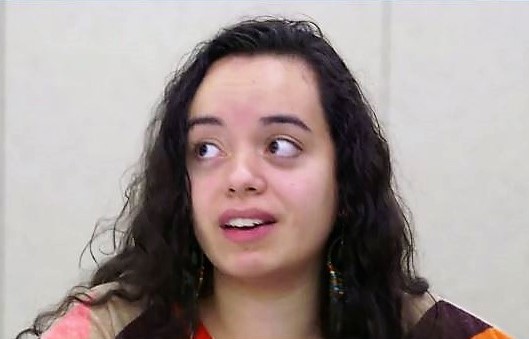
Activist Angy Rivera shares story as undocumented immigrant, survivor of sexual assault
By: Kristin Handley, Contributing Writer
Featured image courtesy of No Le Digas A Nadie
Being an undocumented immigrant or survivor of sexual assault carry feelings of fear and isolation, and being both magnifies those emotions, according to activist and filmmaker Angy Rivera.
Rivera shared her story as an undocumented immigrant woman, and survivor of sexual assault on Sept. 21, during a Lunch and Learn event in the Center for Student Diversity.
For undocumented immigrants, the fear of having their undocumented status reported to authorities is constant, Rivera said.
“You feel like everywhere you go, you can be reported,” she said.
Rivera said she was always nervous around police, hospitals and even school zones, because it only took one call to find out that she wasn’t a legal citizen.
Her status as an undocumented immigrant discouraged her from talking to police about her sexual assault.
Rivera said she was even afraid of talking to her family about being an undocumented immigrant, and survivor of sexual assault.
“Growing up in an immigrant household, you don’t openly talk about being undocumented, especially about abuse,” she said.
Rivera moved to the United States when she was just four years old after she and her family fled civil and drug warfare in Colombia.
Growing up, Rivera remembers her mother, who is also undocumented, telling her that as an undocumented immigrant “you’ll have to work twice as hard.”
In high school, Rivera said she was told that good grades and being involved would be enough to get her into college. Unfortunately, that promise did not hold true.
Not having a social security number proved to be a serious barrier when Rivera was applying to college. Although she overcame that obstacle and was accepted into John Jay College of Criminal Justice, another problem arose: the means of paying for tuition.
As an undocumented immigrant, Rivera did not qualify for financial aid. That left paying for college classes and tuition very expensive.
She was forced to drop out of college periodically to save money for tuition. But after seven years, she graduated with a degree in Culture and Deviance Studies with a minor in Human Services.
After graduating, Rivera faced workplace harassment from men who were “looking at me, and talking to me inappropriately.”
“They were predators,” she said.
She didn’t get paid minimum wage, nor was she supported in her decision to leave that job. Yet she eventually left to work for the New York State Youth Leadership Council, a non-profit organization for undocumented youth, which she continues to work with today.
In 2012, Rivera learned she could apply for a “U Visa,” which is given to immigrants in America who are survivors of sexual assault or other types of violence, and offers a possible path to citizenship for people who are not citizens.
However, there are stipulations to the U Visa. The crime needs to be reported to a law enforcement official, and the survivor of the assault needs to write a detailed affidavit of what happened to them.
Rivera said this process is “all kinds of messed up” because often, survivors of any assault try to repress those memories and details about their abuse, and that having to remember the specifics of each event is re-traumatizing.
Rivera said she is currently in the process of applying for her green card.
Since earning her U Visa and working towards her green card, Rivera has participated in and spoken at protests.
Towson also hosted a movie screening on Sept. 20 of Rivera’s documentary film “No Le Digas A Nadie,” which was released in September 2015.
Student Sheri Razaq, who is majoring in cultural studies, said Rivera was “so brave to come out” and that the confidence she exerted “made me feel hopeful.”
Brenda Oduola, a graduate assistant in the CSD, said that by someone sharing their life story, they can help other people in similar situations.
“It’s interesting to me how people come out and share these intimate details of their lives, and then use it to impact others who might be going through the same things,” Oduola said.
Student Erica Partner said listening to Rivera’s life story helped confirm her own career goals of becoming a social worker.
“The speech has opened up more possibilities to the populations that I am going to be working with, and has given me more of an understanding what situations I could potentially be put in,” Partner said.

